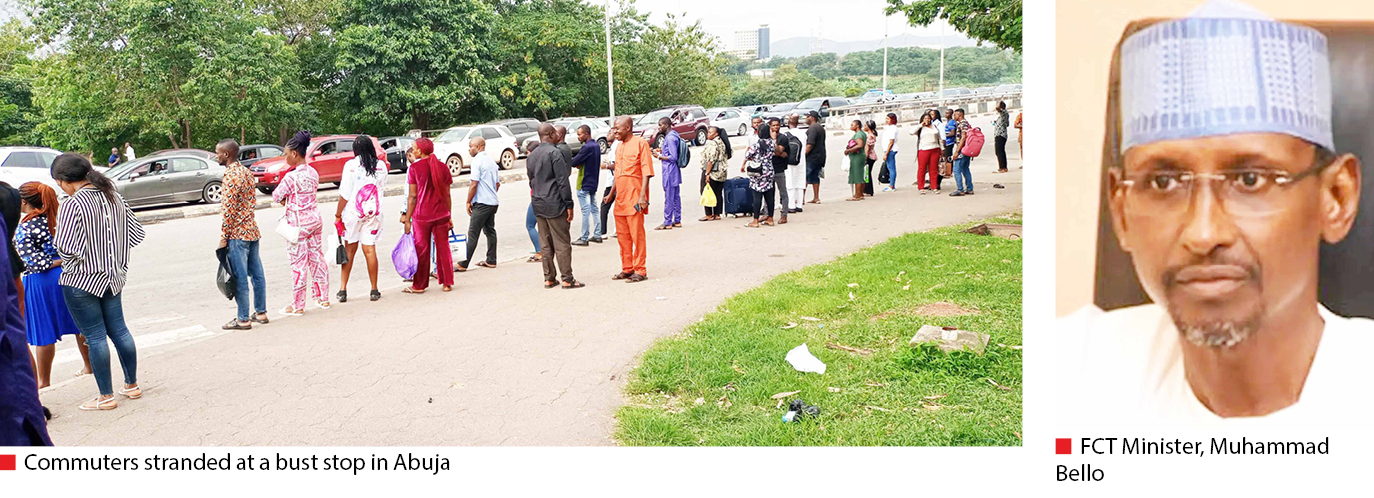In the last eight years, the transportation sector in FCT has remained difficult and challenging for its residents, Daily Trust Saturday reports.
One noticeable impact of population explosion in Abuja, the country’s capital, is in the area of public transportation. Some of the residents of the Federal Capital Territory (FCT) who spoke with Daily Trust Saturday believe that the situation has become so bad that its effects have been stretched to almost a breaking point. This, they said, was having impact on other sectors of the economy. Noticeable is the suffering commuters usually pass through on a daily basis to get to their places of work, as well as unnecessary traffic jams and congestion along major arterial roads.
Residents share plights, evaluate outgoing minister’s transport policy
Because of the importance of effective transport system of a city like Abuja, many residents believe that for any administration to be taken seriously, it must be courageous enough to tackle challenges in the sector, which, according to them, have the potentials of positively affecting other sectors of the economy. But to the residents, the outgoing Federal Capital Territory (FCT) Administration has failed in this regard. To many of them, the public transportation system in the country’s capital has collapsed.
- Only opposition parties will say Buhari’s eight years is a failure – Garba Shehu
- Please Forgive me, Ganduje begs Kano people
Every morning and evening on workdays, hundreds of residents would converge on any of the bus stops and junctions in different parts of Abuja, desperately waiting for vehicles to convey them to or from workplaces.
Our findings revealed that in some areas, residents would have to wait for over an hour before accessing a means of transportation to their destinations.
At most of the parks visited, Daily Trust Saturday witnessed commuters rushing to vehicles on arrival in order to secure seats.
Most of those who have one thing or another to do in the metropolis reside at satellite towns, such as the Kubwa-Zuba axis, Nyanya-Mararaba axis and the Bwari axis of the city, Kuje, Gwagwalada, among others.
Speaking to our reporter, residents lamented that commuters in the city depended majorly on private car owners for their means of transportation.
A civil servant, Michael Daniel, told Daily Trust Saturday that, “Life in Abuja is largely miserable, as far as public transportation is concerned. The masses are at the mercy of private motorists who often charge twice the usual fare.”
Another civil servant, Madam Joy Anyanwu simply said, “Public transportation in Abuja has collapsed.
Tunde Olayinka, a resident of Dei Dei, whose office is in Wuse, said getting a vehicle to convey him to his workplace during rush hours was always a struggle. He said, “You have to struggle for a seat once a vehicle arrives at this junction (army barracks, Phase 2 junction) or you may end up going to work very late.”
Status of ‘El-Rufai’ buses
The Abuja Urban Mass Transport Company Limited (AUMTCO), popularly known as El-Rufai buses, established by the then Ministry of Federal Capital Territory, now the Federal Capital Territory Administration (FCTA) in 1984 as Abuja Bus Service (ABS), and later registered as Abuja Urban Mass Transport Company Limited under the Companies and Allied Matters Act, 1990, was meant to address the transportation needs of a city that was blossoming at a high speed.
The outfit, among other things, was designed to provide “the best value for money and safest, most reliable scheduled and buses hire service in Nigeria. It was also to plan, develop and implement an organised environmentally friendly and sustainable urban public transport system in the FCT for effective, comfortable, safe, regular, efficient and affordable transport service delivery.
In addition to implementing the Abuja master plan with regard to urban transportation, it was also to develop a sustainable means of funding urban public transportation services in the FCT, evolve appropriate policy framework to subsidise urban public transportation and provide adequate transport infrastructure in the territory, with particular reference to urban public transportation.
As the largest bus transportation company in Nigeria with a staff strength of 518, AUMTCO took off with funds totalling N1.3billion, which were to be used for the procurement of over 500 high-capacity buses for designated routes in the territory, including Abuja-Mararaba, Abuja-Bwari, Abuja-Kuje, Abuja-Gwagwalada and Abuja-Suleja respectively.
Before long, the arrival of the high-capacity buses led to the ban of the popular mini buses known as ‘Araba’, which plied the capital city in 2013, all in a bid to make for smooth operations of the AUMTCO.
By 2014, the administration, headed by the then minister, Senator Bala Mohammed, launched over 100 high-capacity buses to add to the already available ones.
“These new buses would go a long way in alleviating the transportation problems of residents of the FCT, especially the majority of workers living in satellite towns,” a former vice president, Mohammed Namadi Sambo said while launching the buses.
But eight years down the line, most of the high-capacity buses have disappeared on all the routes to satellite towns, even within the city centre.
Investigation by Daily Trust Saturday further revealed that most of the buses are parked at FCTA yard, Katampe Hill, along the Kubwa-Zuba road; hence they are no longer available for residents, who lack an alternative means of transportation. Some of the buses that had only minor mechanical faults were left to rot, alongside those with major faults.
Light rail not working
In an effort to find a better alternative to reduce the transportation challenges of the residents of the country’s capital, the federal government came with the light rail project for the city.
But the multi-billion naira Abuja Rail Mass Transit, also known as Abuja Light Rail, is rotting away after being abandoned for years.
Daily Trust Saturday reports that the metro rail, which was commissioned by President Muhammadu Buhari on July 12, 2018 and opened for passengers the following week, has since been abandoned, paving the way for vandals to feast on the facility.
The project was originally meant to solve the perennial transportation problem in the FCT and its adjoining towns and cities.
When the metro rail was opened for business in 2018, only the section from the Abuja Metro Station in the Central Business District, to the airport, was put to use, with an intermediate station at Idu.
The entire project was proposed to cover a total distance of 290 km (180 mi) to be developed in six phases or lots.
It was to cost US$824 million, with 60 per cent to be funded with loans from the Exim Bank of China.
After all the paper works, which were not made public, were completed, construction work on lots 1 and 3 commenced.
Sadly, the train service soon folded up, and therefore, did not add value to the citizens, who are in serious need of an efficient transportation system.
Thousands of commuters who were aware of the planned light rail project and anxiously waiting for it to mature are still in shock at the wisdom behind constructing the first phase of the multi-million dollar project in an obscure location.
Although there were expansion plans, most of the people who spoke to Daily Trust Saturday said the ideal thing was for the government to first construct the rail line in areas it was needed before expanding it to other locations.
The outgoing administration’s efforts
Worried by the continued deterioration of the public transportation system in the country’s capital the Federal Capital Territory Executive Committee (FCT EXCO) mandated the Abuja Investment Company Limited (AICL) to resuscitate the Abuja Urban Mass Transport Company (AUMTCO) for effective mass transportation services in the territory.
The AICL is an investment company established by the FCT Administration saddled with the responsibility of managing assets, investments and business interests of the government.
The EXCO instructed the Board to turn the situation of the transport company around by improving its performance to enable it play its statutory role of mass movement of commuters for the overall interest and benefits of residents, especially the less privileged.
It also charged the Abuja Investment Company Limited to critically look into the affairs of the AUMTCO and ensure that the buses get back on the roads in order to meet the aims for which it was established.
Also, the FCT minister, Muhammadu Musa Bello, recently paid inspection visit to the Abuja Light Rail project, where he assured that the government would do everything possible to ensure that the system worked before the end of the administration.
But few weeks to the end of the administration, nothing much is seen on the ground to ensure reopening of operations of the rail system.
What must be done
Ikenna Uche, a transport expert at one of the parks in Kubwa, told our reporter that the failure of the AUMTCO to live up to expectations was responsible for the high volume of passengers hanging around major bus stops in the city, including Berger Junction, Area 1 Junction, the Federal Secretariat, FCT Roundabout, among others at the close of business each day. The situation worsens when there is a heavy rainfall.
Uche said, “I am not saying it is the right thing, but as businessmen we take advantage of this failure on the part of the government to increase our fares from the usual N200 to N300, and at times, even N400 for a trip from Kubwa to Airport Junction, Wuse, Berger, Area 1 and other areas.
“Unfortunately, the failure of the mass transit buses to cover the entire FCT effectively has led to a situation where all manner of persons resort to the transportation business. In some cases, criminals masquerade as transporters and rob commuters of their valuables.”
He said the only solution was to resuscitate the urban mass transport system with an effective management system.
“The Abuja light rail project should have also helped, but the way they routed it, even if it starts operation today it will not have much impact,’’ he said.
He said the rail should have linked satellite towns where majority of the people who come to the city centre on a daily basis live.

 Join Daily Trust WhatsApp Community For Quick Access To News and Happenings Around You.
Join Daily Trust WhatsApp Community For Quick Access To News and Happenings Around You.


